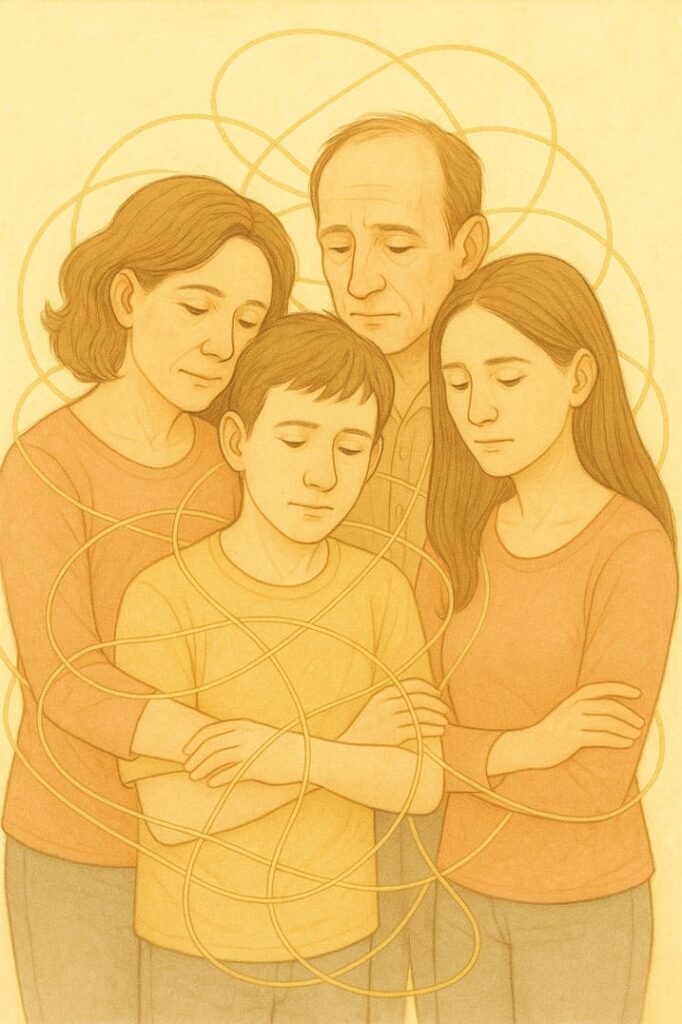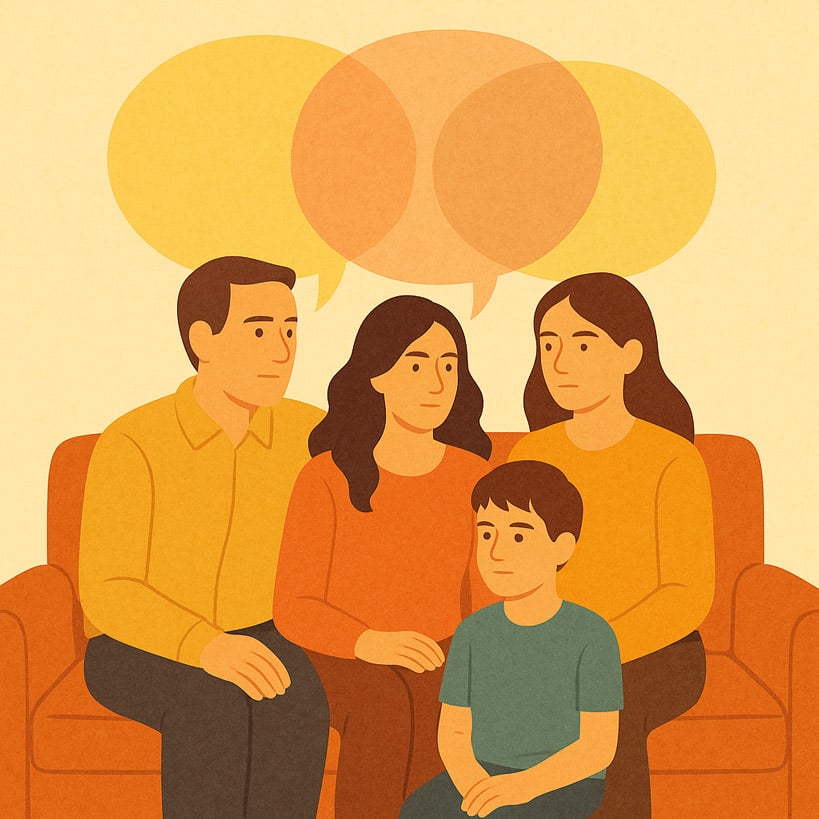Emotional closeness is a cornerstone of family life, fostering connection and support. But when this closeness crosses into enmeshment—where emotional boundaries blur and individuality fades—it can create deep challenges. Enmeshment might look like struggling to make decisions without family approval, feeling overwhelmed by others’ emotions, or having no personal space.
For those dating someone from an enmeshed family, the impact can hit hard—perhaps you’re caught in a tug-of-war for their attention or wrestling with boundaries that never seem to stick. These situations can feel exhausting and isolating, but you’re not alone, and there’s a way forward.
In this article, we’ll unpack what enmeshment really means, spotlight the signs to watch for, and share practical steps to navigate its effects—whether you’re in the family or supporting a partner through it. Keep reading for clarity, strategies, and hope for healthier relationships.
What Is An Enmeshed Family?

In modern psychology, familial enmeshment is a framework used to describe a family system or dynamics characterized by:
- Blurred or porous boundaries;
- Confused roles and expectations;
- Limited individuality and personal autonomy;
- Emotional over-identification among its members.
In these families, there’s often a high degree of emotional fusion, where others closely mirror the feelings of one family member. This typically creates an environment (system) with an extreme level of interconnectedness, in which the thoughts, feelings, and behaviors of individual family members become indistinguishable from one another.
While closeness in familial relationships is empowering and elevating, when taken to the extreme, it becomes the polar opposite. This is the case with enmeshed systems, which are known to hinder the development of personal identity and autonomy.
These characteristics are salient in children who are a part of or originate from enmeshed families and can persist into adulthood if not addressed. However, parents and other family members can exhibit these traits with the same and, sometimes, greater intensity.
The last thing to note is that the prevalence and intensity of familial enmeshment aren’t set values. They can vary depending on the influence of factors such as family history, societal/cultural norms, communication styles, and personality traits.
The complexity of named factors, along with their sheer volume, makes recognizing and addressing the signs of enmeshed family extremely challenging without a professional therapeutic approach.
What Are The Signs Of An Enmeshed Family?

Family enmeshment can manifest itself in numerous ways and its signs can be challenging to recognize, mostly because they share similar characteristics with some psychological disorders such as codependency or attachment dysregulation.
Therefore, to minimize the chance of confusion and make the signs easier to distinguish from said issues, we’ll be splitting them into two distinct categories (parental and child enmeshment), with enmeshed family examples after each for added clarification:
Parental Enmeshment
Enmeshed parents may exhibit the following behaviors/traits:
- Disregard for individual autonomy: Difficulty respecting or recognizing the independence of a child.
- Example: A parent makes decisions for their children without consideration of their needs, desires, or preferences.
- Over-involvement: Compulsion to know and influence every detail of a child’s life.
- Example: Constantly monitoring and dictating the course of the child’s romantic relationship.
- Blurred boundaries: Limited ability to establish a definitive parent-child dynamic within a family unit.
- Example: Sharing inappropriate details about personal life with a child.
- Emotional fusion: Mirroring the emotional state of the child, even to the point of extreme.
- Example: Feeling deeply stressed or anxious when a child faces challenges, whether at school, work, or personal.
- Over-identification: A parent ties their self-worth to that of their child.
- Example: Pressuring a child to pursue a parent’s unfulfilled aspirations.
- Isolation: Believing they can provide every form of support to their child.
- Example: Discourage a child from reaching out to anyone outside the established (enmeshed) circle.
Child Enmeshment
Children from enmeshed families may exhibit the following signs:
- Limited individuality: Not having a clearly defined sense of self; feeling like being lost;
- Example: A child adopts the interests or goals of the parent rather than exploring their preferences.
- Caregiving tendencies: Feeling overly responsible for the welfare of others;
- Example: A child feels obligated to solve their parents’ problems, neglecting their well-being.
- Over-dependence: Basing self-worth on the opinions of their enmeshed parents;
- Example: Feeling an overwhelming need for approval and validation from parents.
- Lack of autonomy: Acting or behaving in ways that align with parent’s expectations.
- Example: Pursuing the unfulfilled aspirations of the parent despite not sharing their interests.
- Conflict avoidance: Keeping away from any confrontation out of fear of disrupting the illusion of a harmonious family dynamic; not knowing how to say “no”;
- Example: Consistently refraining from expressing own opinions and, instead, conforming to parents’ viewpoints.
- Struggling with personal boundaries: Difficulties maintaining personal space and privacy.
- Example: (Over)Sharing inappropriate details about their intimate relationships with anyone, even recent acquaintances.
It should be noted that familial enmeshment is highly individual. The intensity can vary and the signs can manifest to differing degrees, depending on numerous factors such as personality traits, upbringing, cultural influences, and life experiences.
This is why addressing the issue must be done on a per-person basis and one step at a time, using methods tailored to the individual and strategies that consider each characteristic.
What Does An Enmeshed Mother Look Like?
An enmeshed mother (or parent, in general) may exhibit one or more of the above mentioned traits and behaviors. For her, a child is the center of her universe and the object upon which she bases her self-worth. However, this often goes to the extreme, where a child becomes their “best friend” and confidant, as well as the source of emotional well being and support.
In addition, she may tend to be overly involved in their children’s lives. This includes trying to make every decision for them, intervening in their affairs, and demanding to know every little detail, even if sharing those details would be inappropriate.
Next, she would often try to imprint her beliefs, morals, personality, and even goals onto the child, pushing it in the direction she considers “right” – even if the child does not share in her views and interests.
Lastly, an enmeshed mother may actively try to dissuade the child from pursuing their goals, asserting their needs, or realizing autonomy in any other way. However, doing so effectively fosters mutual dependency, in turn hindering the personal growth and development of both individuals.

Are Enmeshed Parents Narcissistic?
There’s no simple “yes” or “no” answer to this question, as narcissism and enmeshment are two distinct concepts:
- Enmeshment refers to interpersonal dynamics within a family, friendship, romantic partnership, or even professional relationship;
- Narcissism is a personality trait or disorder characterized by patterns of grandiosity, entitlement, arrogance, lack of empathy, and pervasive need for admiration.
While they occur independently, enmeshment and narcissism can coexist, with the latter typically contributing to the enmeshed family dynamics. The reason for this lies in one of the defining characteristics of narcissism: blatant disregard for personal boundaries and autonomy, which can reinforce enmeshing dynamics.
Alternatively, enmeshment can be used as a manipulation tool by a narcissistic partner or parent to foster dependency and elicit caregiving behavior that would benefit none other than the manipulative narcissist at the expense of the other person’s well-being.
It must be noted that not all enmeshed individuals are narcissistic by default, and not all narcissists necessarily create enmeshed family dynamics. However, they do play into each other, generally enforcing harmful and toxic behaviors to the detriment of all individuals in a relationship.
Dating Someone from an Enmeshed Family
Dating someone from an enmeshed family can present unique challenges, as their family dynamics may influence your relationship. You might feel like you’re competing for your partner’s time and attention, especially if their family expects constant involvement or disapproves of choices prioritizing your relationship. Boundary violations, such as uninvited family input on your plans, can also strain your connection. Additionally, your partner may struggle with guilt or anxiety when balancing family expectations with your needs, rooted in deep-seated attachment patterns.
To navigate these dynamics, open communication is key. Discuss your needs calmly, like setting aside dedicated couple time without family interruptions. Work together to establish healthy boundaries, such as limiting how often family members are involved in decisions. If challenges persist, couples therapy can provide tools to strengthen your relationship while respecting their family ties. Understanding these patterns can foster empathy and build a healthier partnership.
Challenges and Solutions When Dating Someone from an Enmeshed Family
| Challenge | How to Address It |
|---|---|
| Difficulty setting boundaries with your partner’s family | Communicate openly with your partner about your needs. Work together to set clear boundaries, such as limiting family involvement in your personal plans or decisions. |
| Feeling like an outsider or competing for attention | Build relationships with family members to foster connection, but prioritize dedicated couple time without family interruptions to strengthen your bond. |
| Partner’s guilt or anxiety about prioritizing the relationship | Encourage your partner to express their feelings. Support them in making decisions that prioritize your relationship, and consider therapy if guilt or anxiety persists. |
| Family expectations interfering with the relationship | Discuss family events or requests as a team. Agree on how to handle them in a way that respects both your relationship and their family ties. |
| Partner’s struggle with independence or identity | Encourage your partner to explore their own interests and build a sense of self outside the family. Support their growth while being patient with the process. |
| Impact on intimacy or trust in the relationship | Address any trust issues by fostering open communication and understanding. Consider couples therapy to work through deeper issues related to enmeshment. |
Frequently Asked Questions about Enmeshed Families and Relationships
Enmeshment can make it hard for someone to set healthy boundaries, often leading to codependency or difficulty trusting others outside their family. They might prioritize their family’s needs over their own, which can strain romantic relationships and make independence a challenge.
People raised in enmeshed families may feel guilt, anxiety, or resentment when they try to carve out their own space. They might also struggle with a shaky sense of self or find it tough to express emotions independently of their family’s influence.
You might notice your partner struggles to say “no” to their family, or that their family often meddles in your relationship. They could feel caught between you and their family’s expectations, so patience and clear communication will be essential.
Gently encourage your partner to voice their own needs and start with small boundaries, like keeping some decisions just between the two of you. Be there for them as they deal with any guilt or resistance from their family—it’s a big step, and your support matters.
Break Free from Enmeshed Family Patterns with PIVOT
If you’re struggling with the effects of an enmeshed family—whether in your own life or through a relationship—know that you’re not alone, and there is a path forward. At PIVOT, we specialize in helping individuals like you reclaim your individuality and autonomy. Our highly trained and certified coaches are here to guide you through this journey, offering tailored professional support to meet your unique needs. Take the first step toward healthier, more fulfilling relationships by reaching out today to learn more about our transformative Glass House Retreat.


